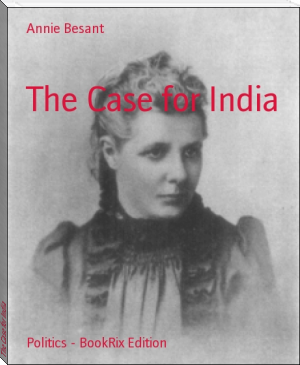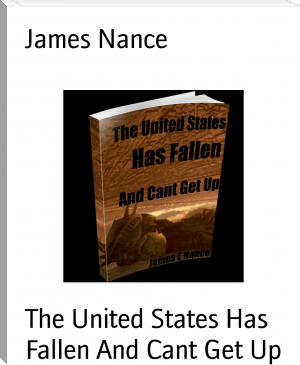The Case for India by Annie Besant (100 best novels of all time TXT) 📕

Read free book «The Case for India by Annie Besant (100 best novels of all time TXT) 📕» - read online or download for free at americanlibrarybooks.com
- Author: Annie Besant
Read book online «The Case for India by Annie Besant (100 best novels of all time TXT) 📕». Author - Annie Besant
England has to fear. They are the persons who can, if they
will, deal a blow of the deadliest character at the future rule
of England.
I have ventured to urge this danger, which has increased of late years, in consequence of the growing self-respect of the Indians, but the ostrich policy is thought to be preferable in my part of the country.
This stunting of the race begins with the education of the child. The Schools differentiate between British and Indian teachers; the Colleges do the same. The students see first-class Indians superseded by young and third-rate foreigners; the Principal of a College should be a foreigner; foreign history is more important than Indian; to have written on English villages is a qualification for teaching economics in India; the whole atmosphere of the School and College emphasises the superiority of the foreigner, even when the professors abstain from open assertion thereof. The Education Department controls the education given, and it is planned on foreign models, and its object is to serve foreign rather than native ends, to make docile Government servants rather than patriotic citizens; high spirits, courage, self-respect, are not encouraged, and docility is regarded as the most precious quality in the student; pride in country, patriotism, ambition, are looked on as dangerous, and English, instead of Indian, Ideals are exalted; the blessings of a foreign rule and the incapacity of Indians to manage their own affairs are constantly inculcated. What wonder that boys thus trained often turn out, as men, time-servers and sycophants, and, finding their legitimate ambitions frustrated, become selfish and care little for the public weal? Their own inferiority has been so driven into them during their most impressionable years, that they do not even feel what Mr. Asquith called the "intolerable degradation of a foreign yoke."
India's Rights.
It is not a question whether the rule is good or bad. German efficiency in Germany is far greater than English efficiency in England; the Germans were better fed, had more amusements and leisure, less crushing poverty than the English. But would any Englishman therefore desire to see Germans occupying all the highest positions in England? Why not? Because the righteous self-respect and dignity of the free man revolt against foreign domination, however superior. As Mr. Asquith said at the beginning of the War, such a condition was "inconceivable and would be intolerable." Why then is it the one conceivable system here in India? Why is it not felt by all Indians to be intolerable? It is because it has become a habit, bred in us from childhood, to regard the sahib-log as our natural superiors, and the greatest injury British rule has done to Indians is to deprive them of the natural instinct born in all free peoples, the feeling of an inherent right to Self-determination, to be themselves. Indian dress, Indian food, Indian ways, Indian customs, are all looked on as second-rate; Indian mother-tongue and Indian literature cannot make an educated man. Indians as well as Englishmen take it for granted that the natural rights of every Nation do not belong to them; they claim "a larger share in the government of the country," instead of claiming the government of their own country, and they are expected to feel grateful for "boons," for concessions. Britain is to say what she will give. The whole thing is wrong, topsy-turvy, irrational. Thank God that India's eyes are opening; that myriads of her people realise that they are men, with a man's right to freedom in his own country, a man's right to manage his own affairs. India is no longer on her knees for boons; she is on her feet for Rights. It is because I have taught this that the English in India misunderstand me and call me seditious; it is because I have taught this that I am President of this Congress to-day.
This may seem strong language, because the plain truth is not usually put in India. But this is what every Briton feels in Britain for his own country, and what every Indian should feel in India for his. This is the Freedom for which the Allies are fighting; this is Democracy, the Spirit of the Age. And this is what every true Briton will feel is India's Right the moment India claims it for herself, as she is claiming it now. When this right is gained, then will the tie between India and Great Britain become a golden link of mutual love and service, and the iron chain of a foreign yoke will fall away. We shall live and work side by side, with no sense of distrust and dislike, working as brothers for common ends. And from that union shall arise the mightiest Empire, or rather Commonwealth, that the world has ever known, a Commonwealth that, in God's good time, shall put an end to War.
II. THE SECONDARY REASONS.
Tests of Efficiency.
The Secondary Reasons for the present demand for Home Rule may be summed up in the blunt statement: "The present rule, while efficient in less important matters and in those which concern British interests, is inefficient in the greater matters on which the healthy life and happiness of the people depend." Looking at outer things, such as external order, posts and telegraphs--except where political agitators are concerned--main roads, railways, etc., foreign visitors, who expected to find a semi-savage country, hold up their hands in admiration. But if they saw the life of the people, the masses of struggling clerks trying to educate their children on Rs. 25 (28s. 0-1/4d.) a month, the masses of labourers with one meal a day, and the huts in which they live, they would find cause for thought. And if the educated men talked freely with them, they would be surprised at their bitterness. Gopal Krishna Gokhale put the whole matter very plainly in 1911:
One of the fundamental conditions of the peculiar position of
the British Government in this country is that it should be a
continuously progressive Government. I think all thinking men,
to whatever community they belong, will accept that. Now, I
suggest four tests to judge whether the Government is
progressive, and, further, whether it is continuously
progressive. The first test that I would apply is what measures
it adopts for the moral and material improvement of the mass of
the people, and under these measures I do not include those
appliances of modern Governments which the British Government
has applied in this country, because they were appliances
necessary for its very existence, though they have benefited
the people, such as the construction of Railways, the
introduction of Post and Telegraphs, and things of that kind.
By measures for the moral and material improvement of the
people, I mean what the Government does for education, what the
Government does for sanitation, what the Government does for
agricultural development, and so forth. That is my first test.
The second test that I would apply is what steps the Government
takes to give us a larger share in the administration of our
local affairs--in municipalities and local boards. My third
test is what voice the Government gives us in its Councils--in
those deliberate assemblies, where policies are considered.
And, lastly, we must consider how far Indians are admitted into
the ranks of the public service.
A Change of System Needed.
Those were Gokhale's tests, and Indians can supply the results of their knowledge and experience to answer them. But before dealing with the failure to meet these tests, it is necessary to state here that it is not a question of blaming men, or of substituting Indians for Englishmen, but of changing the system itself. It is a commonplace that the best men become corrupted by the possession of irresponsible power. As Bernard Houghton says: "The possession of unchecked power corrupts some of the finer qualities." Officials quite honestly come to believe that those who try to change the system are undermining the security of the State. They identify the State with themselves, so that criticism of them is seen as treason to the State. The phenomenon is well known in history, and it is only repeating itself in India. The same writer--I prefer to use his words rather than my own, for he expresses exactly my own views, and will not be considered to be prejudiced as I am thought to be--cogently remarks:
He (the official) has become an expert in reports and returns
and matters of routine through many years of practice. They are
the very woof and warp of his brain. He has no ideas, only
reflexes. He views with acrid disfavour untried conceptions.
From being constantly preoccupied with the manipulation of the
machine he regards its smooth working, the ordered and
harmonious regulation of glittering pieces of machinery, as the
highest service he can render to the country of his adoption.
He determines that his particular cog-wheel at least shall be
bright, smooth, silent, and with absolutely no back-lash. Not
unnaturally in course of time he comes to envisage the world
through the strait embrasure of an office window. When perforce
he must report on new proposals he will place in the forefront,
not their influence on the life and progress of the people, but
their convenience to the official hierarchy and the manner in
which they affect its authority. Like the monks of old, or the
squire in the typical English village, he cherishes a
benevolent interest in the commonalty, and is quite willing,
even eager, to take a general interest in their welfare, if
only they do not display initiative or assert themselves in
opposition to himself or his order. There is much in this
proviso. Having come to regard his own judgment as almost
divine, and the hierarchy of which he has the honour to form a
part as a sacrosanct institution, he tolerates the laity so
long as they labour quietly and peaceably at their vocations
and do not presume to inter-meddle in high matters of State.
That is the heinous offence. And frank criticism of official
acts touches a lower depth still, even _lese majeste_. For no
official will endure criticism from his subordinates, and the
public, who lie in outer darkness beyond the pale, do not in
his estimation rank even with his subordinates. How, then,
should he listen with patience when in their cavilling way they
insinuate that, in spite of the labours of a high-souled
bureaucracy, all is perhaps not for the best in the best of all
possible worlds--still less when they suggest reforms that had
never occurred even to him or to his order, and may clash with
his most cherished ideals? It is for the officials to govern
the country; they alone have been initiated into the sacred
mysteries; they alone understand the secret working of the
machine. At the utmost the laity may tender respectful and
humble suggestions for their consideration, but no





Comments (0)